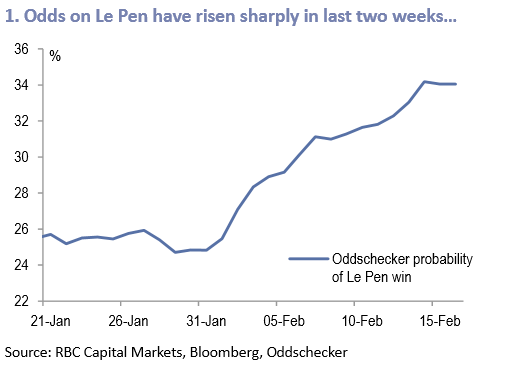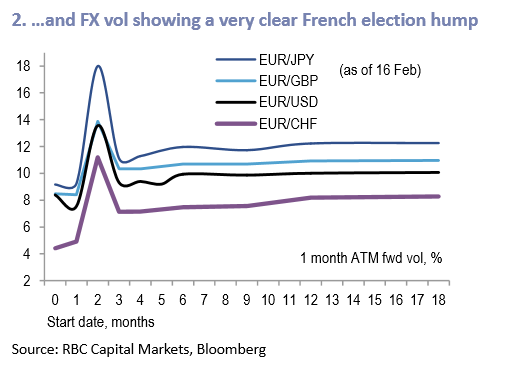Euro a Buy as Le Pen Win Over Exaggerated by Nervous Markets

Foreign exchange markets could be guilty of pricing too much political risk into the Euro argue analysts at a leading global investment bank.
RBC Capital Markets reckon there is almost no chance of Marine Le Pen winning the French presidency, yet markets have priced this outcome quite aggressively.
Analysts at RBC Capital reckon there is only a 0.1% probability of Le Pen winning and therefore the Euro is weaker than it should be.
“It may sound foolhardy given the experience of Trump and Brexit, but we think markets are overpricing the probability of a Le Pen victory in the second round.,” says Lisa Lignos at RBC Capital Markets in a note seen by Pound Sterling Live dated February 17.
Based on current polls, Lignos calculates the odds of a Le Pen victory as less than 0.1%, whilst Bloomberg’s Odds Checker tool estimates a probability of 34%:
The huge disconnect implies that markets think there is a higher chance than RBC Capital believe is justified.
If Le Pen were to win analysts at JP Morgan reckon the Euro could fall 10%, but if Lignos and her team are correct then the Euro could rise steeply following Le Pen's failure to win.
RBC Capital Markets believe the high estimation of odds of a Le Pen victory come from markets overlooking the fact that the election has two rounds.
Whilst Le Pen is the favourite to get the most votes in the first round, it is highly unlikely she will win the second round.
The experience of past French Elections shows that the National Front do not do well in second round voting as the French tend to put political differences aside to bandy together and tactically vote against them.
“Since Marine Le Pen took over as leader of the National Front (FN), France has held seven elections (Presidential, Parliamentary, Municipal, European, Regional, and two Departmental). FN has always struggled in two-round votes, even when there are more than two candidates in the second round,” says Lignos.
The National Front’s (FN’s) best performance was in the 2014 European election - the only ones to be held with a single round of voting.
“In two-round elections, FN has performed significantly worse. Take the 2015 Regional and Departmental elections, for example. Just like now, FN was leading in the polls for the first round of voting. Opinion polls were remarkably close in predicting the first-round result. Then a combination of tactical voting and third-placed candidates withdrawing meant that on both occasions the FN lost its first-round lead in every district,” Lignos remarks.
The Legacy of Trump and Brexit
Another reason for markets overestimating the chances of Le Pen becoming president is that forecasters may be overcompensating for their general failure to successfully predict Brexit or Donald Trump’s victory.
Their underestimating of Brexit and Trump may be leading them to overcompensate and overestimate the probability of a Le Pen win.
Although the odds are similar to those for Brexit or Trump winning, Lignos argues that significant inherent differences in the various elections make comparisons unhelpful.
Currently the Bloomberg odds checker is showing that Le Pen has a 34% chance of winning which is, “slightly higher than the bookies’ probability of a UK exit at the same point in time and double the priced probability of exit just a month before the referendum. It is also around 10%pts higher than the priced probability of a Trump victory three months before the US election,” says the RBC analyst.
The overestimation appears to be encompassing financial markets which are showing via option prices, a higher than expected probability of a volatile hump in May during the election.
“Markets appear to be treating it as more likely than the Trump/Brexit results, even though the chances are very significantly lower,” comments Lignos.
A study of the polls leading up to the surprise Brexit and Trump victories actually reveals that although they mostly got it wrong, all of them put the chances the result could swing the other way, within a standard margin of error, or as Lignos says the chances of Brexit or Trump never strayed outside of 95 percent confidence bands.
Polls have been much criticized, but consider this - ahead of the UK referendum, polls showed Leave and Remain in a statistical tie. Heading into the US election, it was a similar story in most swing states. Based on current polls, the probability of a Le Pen second round victory is well below 0.1%.
"Despite this, bookies’ odds of a Le Pen victory are higher now than they were at this stage of the UK/US election campaign. Implied vol is pricing in a big hump of uncertainty around the second round on May 7," says Lignos.
Poll results for the French Presidency, on the other hand, have shown the chance of Le Pen winning has at times fallen outside the 95% confidence band, suggesting a significantly lower chance of a surprise win for her.
What’s more, even if Le Pen won, the general election not long afterward would almost certainly see a more mixed parliament and a likely unsupportive adversary installed as a Prime Minister (PM).
Without the support of her PM and an outright majority in parliament, Le Pen would have difficulty pushing through some of the more controversial anti-European policies that would upset the EU and the impact adversely on the single currency.
Lignos concludes that there is a material chance of the Euro rising as the misjudged political risk is unwound following her probable failure.
She recommends buying EUR/USD put options to profit from an expected rise in the Euro.
“On Wednesday, we suggested buying a three-legged EUR/USD calendar spread: buying a 2m and a 4m put and taking advantage of the hump in vol around the French election to cheapen that up significantly by selling a 3m put. The structure captures the March Fed meeting in the 2m window and the June Fed meeting in the 4m window,” said Lignos.
Risks to this View
RBC Capital acknowledge that there are two main pitfalls for this claim:
1. The polls could be completely wrong. There may be a big contingent of “shy” National Front voters who do not want to reveal that preference to a pollster but will vote that way in the second round. The high share of ‘Don’t knows’ or protest votes could in theory all swing for Le Pen. Or likely Macron/Fillon voters could fail to turn out on the day.
2. Polls could shift materially in the run-up to the election. It has not happened in past elections, and as the previous charts, polling for the second round has been very stable so far, but alleged scandals are constantly surfacing for all three candidates and there are still 1 weeks to go until the second round.
"The calendar of European elections this year leaves scope for downside surprises as ossified establishments are given a populist shake," says Michael Sawicki at Lloyds Bank Commercial Banking.







